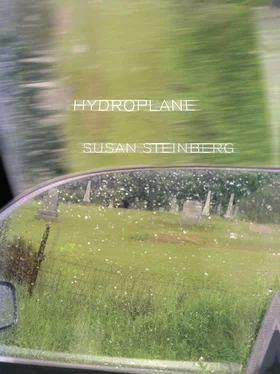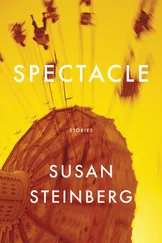Susan Steinberg - Hydroplane - Fictions
Здесь есть возможность читать онлайн «Susan Steinberg - Hydroplane - Fictions» весь текст электронной книги совершенно бесплатно (целиком полную версию без сокращений). В некоторых случаях можно слушать аудио, скачать через торрент в формате fb2 и присутствует краткое содержание. Год выпуска: 2006, Издательство: Fiction Collective 2, Жанр: Современная проза, на английском языке. Описание произведения, (предисловие) а так же отзывы посетителей доступны на портале библиотеки ЛибКат.
- Название:Hydroplane: Fictions
- Автор:
- Издательство:Fiction Collective 2
- Жанр:
- Год:2006
- ISBN:нет данных
- Рейтинг книги:4 / 5. Голосов: 1
-
Избранное:Добавить в избранное
- Отзывы:
-
Ваша оценка:
- 80
- 1
- 2
- 3
- 4
- 5
Hydroplane: Fictions: краткое содержание, описание и аннотация
Предлагаем к чтению аннотацию, описание, краткое содержание или предисловие (зависит от того, что написал сам автор книги «Hydroplane: Fictions»). Если вы не нашли необходимую информацию о книге — напишите в комментариях, мы постараемся отыскать её.
Hydroplane: Fictions — читать онлайн бесплатно полную книгу (весь текст) целиком
Ниже представлен текст книги, разбитый по страницам. Система сохранения места последней прочитанной страницы, позволяет с удобством читать онлайн бесплатно книгу «Hydroplane: Fictions», без необходимости каждый раз заново искать на чём Вы остановились. Поставьте закладку, и сможете в любой момент перейти на страницу, на которой закончили чтение.
Интервал:
Закладка:
Our father found the milk crates where we hid our things in a corner of the garage. He dumped our things out of the milk crates, scattering the things across the floor. We wondered if our father wondered why our things, which should have been in our bedrooms, were in milk crates in the garage. And we wondered if he wondered what the magazines were doing there. The magazines were his.
But our father, most likely, did not even blink, did not even wonder why our things were in the milk crates in the garage. He, most likely, did not even notice that the magazines from beneath his side of the bed were in the milk crates as he turned them over. Our father carried the milk crates to the space between the cars. He stacked the milk crates and stood on the stack. The ladder leaned against the coupe in a way that likely scratched it.
This is really a story about our father. About how he hanged himself in the garage that day. We used to say he hung himself. But the word is hanged.
A neighborhood kid had told us of someone who could breathe through his eyes and so we both tried to breathe through our eyes but could not. We knew if we could breathe through our eyes, we would give the appearance of holding our breath for hours. We practiced this in class for it was something to do to pass the time. But we could only hold our breath for twenty seconds and never breathed through our eyes. We were trying to get to thirty seconds. We thought that perhaps if we got to thirty without breathing, our eyes would have to start to breathe. We started when the second hand reached twelve. We knew if we tried to do this every time the hand reached twelve, we would do this fifty times a class. And the class would go by faster. The hands just dragged around the faces. This day we felt the sickening gray wave. Only when we were breathing. Only when the hand passed near the six, seven, eight, and we were taking in air like the other kids. Only when we were breathing steady, not thinking of not breathing. This day we felt the most sickening gray wave, the wave we felt often enough, though never did we feel this sick. We had watched our father from the sticker bushes through the window after one of their fights. We often watched him through the window. But this time he sat at the kitchen table for longer than he should have. This time he rubbed his face at the table, late for work. We were late for school.
We could never sit still in the synagogue. We did not understand the rabbi's words. We ran down the aisle. We hid in the coatroom. The synagogue ladies yelled, Enough. Our mother never took us for ice cream after. We always rode home in the back seat. We stared out of opposite windows. We said, You never take us for ice cream. Our mother pushed the garage door button. She parked the wagon, said, Your father and his toys, making sure not to hit the coupe.
We played horse after dinner in summers in the drive. All the neighborhood kids came over. The sun went low behind our house. The coupe thundered up the street. We made way for the coupe in the drive. Dad's home, we said. The kids knew to back up into the yard. The basketball got tossed to somewhere. Everyone stood in the yard somewhere to make room for the coupe. Game over, we said.
The rabbi said, There are signs and meanings. He looked at us. We knew of signs and meanings, but we did not know what the rabbi meant.
One day we begged our father for a ride. Our father was doing nothing that day but watching TV. It was Saturday. Our mother had gone to the synagogue. We no longer had to go. Our father was still unshaven. He had purple pouches beneath his eyes. We said to our father, You never take us for a ride, knowing he would cave, knowing he would take us, saying, Get in the coupe already, One up front, One in back. We fought it out, both of us calling shotgun. The coupe was no longer new. Still, it went fast. Still, it went faster than the wagon. It went faster than other cars on the road. We screamed, Faster, faster, when we reached the hilly parts, hoping we would fly off the hills and bump our heads on the roof of the coupe when we landed. We screamed, Slow down, as we neared the toy store, begging our father to pull into the lot and park and let us walk through the store, promising him we would not ask for toys, we would not touch a thing, promising no hysterics when we walked out with nothing new in our hands.
We sat in the lunchroom thinking whether or not we should leave through the back door as we sometimes did, thinking whether or not we should go home and watch TV or play broom hockey in the half of the garage that was always empty in the daytime, the half where our father would park the coupe later that night when he got home from work, tired, way past dinner.
One rule to follow when walking through the toy store was, Look but don't touch, even if there were toys we wanted, ones we'd seen on TV when watching TV after school. One rule was, Keep your hands in your pockets, even if we had no pockets, and we understood what this meant and kept our hands by our sides. One rule was, Don't ask for anything, and we knew we were not supposed to ask for anything, but often we did, often going into fits of hysterics when we were told no, often pulling our hands from our pockets and touching everything we could.
We wanted our mother to drive us to school. One of us said, It looks like rain. We thought we heard thunder. And our mother said, You won't drown. Our parents were having a fight. Our mother said, Take your keys. We wore our keys on strings around our necks. We chewed the strings during class.
The synagogue ladies taught us signs and meanings. They said a loose eyelash meant one could make a wish. A ringing in the ear meant one was being talked about. An itching in the palm meant one would get money. Aching in the legs meant a storm was on its way. They taught us to throw salt over our shoulders. So at dinners we spilled the salt on the tables. They screamed at us that enough was enough. But we shook salt from the shakers onto the floors. And we knocked on wood, we knocked on it hard, on their good tabletops, on the backs of chairs, and as hard as we could, until they called for our mother, said, Enough's enough.
The milk crates were stacked behind the junior high. We took them one day on our way home from school. We wanted to hide our things in the milk crates. We stacked them in a corner of the garage. No one ever looked in the corners.
We found our father leaning against the coupe in the parking lot of the toy store. He was looking off into who knows what. We said, Can we have something, and our father said, Not today. And we said, Why not, and our father said, Because I said so, and we said, We'll pay you back, and our father said, You have no money, laughing, saying, You have nothing, but we were almost in junior high and we said, We can get the money, and he said, You have nothing, but he was looking at who knows what. The sky.
It was hard to tell why they were fighting. Our father said something. Our mother said, What do you care. They thought we had already gone to school. But really we were hiding in the sticker bushes out front, watching their fight through the window. We saw our mother hurl her car keys across the kitchen. They just missed hitting our father's face. Our father had ducked just in time. He said something. She said, What do you care. Our father said, Wait. But she left the house. We ducked lower in the bushes, laughing. Our mother was running down the drive. We looked through the window to see our father hurl a plate to the front door. He sat at the kitchen table. He rubbed his face. The pouches beneath his eyes looked darker. He was not crying. We felt the gray wave and stopped laughing.
But, really, it seems like none of this ever happened.
In the lunchroom one of us folded a piece of paper into a fat triangle, and one of us pushed it toward the other, and the other pushed it back, and so on, until the lunchroom bell rang, and we had just two classes left before we could walk home. We were no longer thinking of our father sitting at the kitchen table that morning, which seemed days ago already, really, all those minutes in a day, our father sitting there, the darkest pouches beneath his eyes, rubbing his just-shaved face. Really, it seemed like it never happened.
Читать дальшеИнтервал:
Закладка:
Похожие книги на «Hydroplane: Fictions»
Представляем Вашему вниманию похожие книги на «Hydroplane: Fictions» списком для выбора. Мы отобрали схожую по названию и смыслу литературу в надежде предоставить читателям больше вариантов отыскать новые, интересные, ещё непрочитанные произведения.
Обсуждение, отзывы о книге «Hydroplane: Fictions» и просто собственные мнения читателей. Оставьте ваши комментарии, напишите, что Вы думаете о произведении, его смысле или главных героях. Укажите что конкретно понравилось, а что нет, и почему Вы так считаете.












